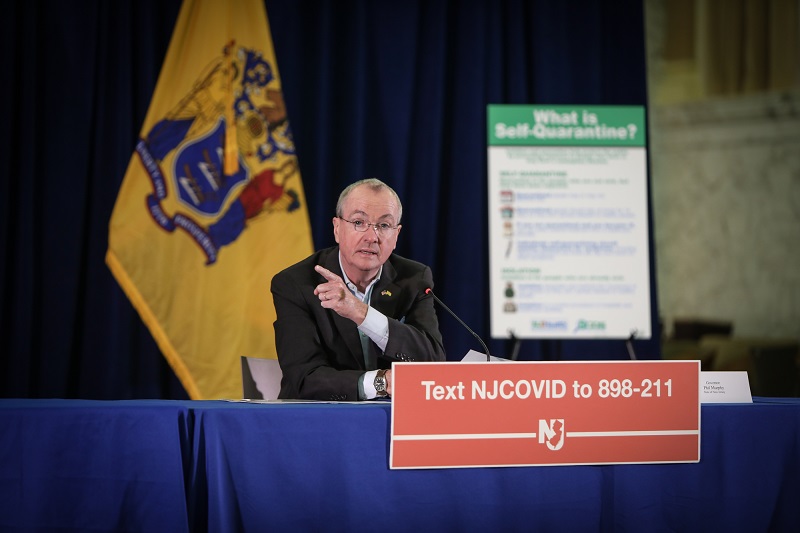Gov. Phil Murphy speaks during a recent press briefing on the state’s efforts to combat the spread of COVID-19 and help residents who are affected by the crisis. — Photo by Edwin Torres/Governor’s Office
By Joshua Burd
The state will provide at least $100 million in assistance to low- and moderate-income renters impacted by the COVID-19 crisis, under a program announced Friday by Gov. Phil Murphy.
The relief program, which will open for applications in July, will begin paying rental assistance in September to a pool that includes the homeless or those who are at risk of homelessness, according to a news release. Qualifying households will be expected to pay 30 percent of their income toward rent, while the program would pay the remainder directly to landlords, up to the Department of Community Affairs’ fair market rent payment standard.
After three months, the state will review household budgets to determine if assistance is still needed. Assistance that is no longer required will be used to serve additional families.
“From the moment this crisis took hold, we’ve made it clear that New Jerseyans should not fear losing their home as a result of financial hardship caused by COVID-19,” Murphy said. “This program will provide at least $100 million in housing relief for low- and moderate-income families who need it most. We’ll continue working closely with our legislative and community-based partners to further strengthen protections for tenants.”
The state will provide the assistance primarily with funds from the recent federal coronavirus relief bill, Murphy said during his daily briefing on Friday. Known as the COVID-19 Short-Term Rental Assistance Program, the state’s plan provides an answer to calls by apartment industry advocates, who have pressed for support for their tenants and for landlords whose operations have been impacted by the pandemic.
“From the start of this crisis, our association and membership have been advocating for a rental assistance program to help those in need,” said David Brogan, executive director of the New Jersey Apartment Association. “The use of federal and state funds to support tenants facing financial challenges is imperative to keeping tenants in their homes and the multifamily industry intact. Our association looks forward to reviewing details of the state rental assistance program as they become available.”
The NJAA noted that it supported a legislative proposal for rental assistance — introduced as bill Nos. S2332 and A3956 — which passed both the Senate and Assembly earlier this month and would have used an existing DCA program. Murphy did not sign the bill, which also called for a higher income threshold at which residents could qualify for assistance.
“We are supportive of that well-thought out legislation due to the fact that it established rational criteria, focused on those impacted by COVID-19, and had protections to mitigate fraud,” Brogan added. “It is our sincere hope that the governor’s program will incorporate and mirror those provisions.”
Murphy’s plan will devote roughly 20 percent of funding to serve those with very low incomes and those who are homeless or at risk of homelessness, providing them with up to 12 months of rental assistance. The DCA will select the households through a process known as coordinated entry, which centers on direct one-on-one case management, in each county’s Homeless Management Information System.
To help families reach self-sufficiency, the department will provide additional case management, financial planning and other assistance.
DCA will administer the remainder of the funding through an online lottery, the news release said. When the lottery opens, households may submit applications and participants will be picked from the overall pool of applicants through a randomized process based on eligibility and the lottery criteria.
Applicants selected through the lottery will be eligible for up to six months of short-term rental assistance. Should further funding become available, DCA will serve additional households.
“We understand the challenges families are facing at this difficult time and it is our goal to help as many people as possible, which is why we developed this new rental assistance program,” said Lt. Gov. Sheila Y. Oliver, who also serves as the department’s commissioner. “In addition to the new program, DCA is also urging households in need to apply for the Low Income Home Energy Assistance Program (LIHEAP), which helps people pay for their home energy bills. With additional funding through the Coronavirus Aid, Relief and Economic Security (CARES) Act, New Jersey is able to help even more families cover their rent and energy expenses through this crisis.”
Households may qualify for the lottery based on these standards:
- New Jersey resident
- Maximum income up to 80 percent of area median income
- Current in their rental payments as of March 1, 2020
- Able to provide proof of impact of COVID-19 beginning on March 9, 2020 when Murphy declared the state of emergency
- Laid off, reduced work hours, unpaid leave to take care of children due to school and daycare closures and/or need to self-quarantine for 14 days resulted in a loss of income
The COVID-19 Short Term Rental Assistance Program website will launch on June 15 with additional information at https://www.nj.gov/dca/divisions/dhcr/offices/shorttermrap.html.
DCA will provide the centralized application intake, eligibility review and payment directly to participants’ landlords. As part of the contract, DCA will encourage landlords to agree to a reasonable payment plan for any rent arrearages, not to evict for any arrearages accumulated prior to the start of temporary rental assistance and not to evict due to unpaid rent for six months after the end of assistance.










